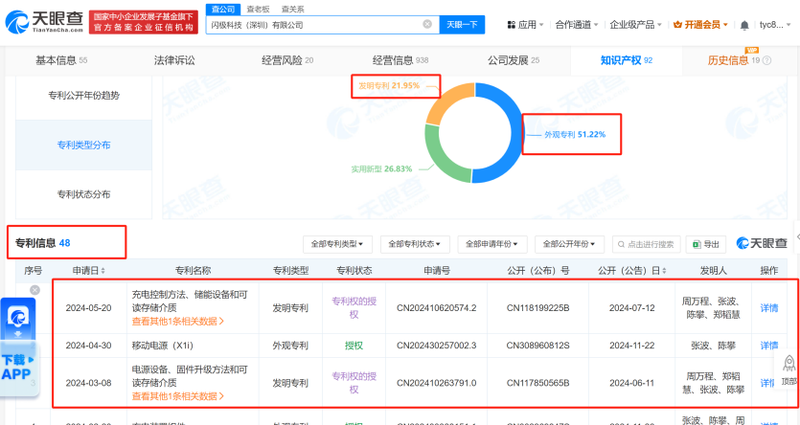Can Shanji Technology, a Cross-border Entrant, Seize the Opportunity in the AI Glasses Market with a Sales Target of 500,000 Units?
![]() 12/24 2024
12/24 2024
![]() 676
676

Image source: Visual China
Blue Whale News, December 23 (Reporter: Zhai Zhichao)
Shanji Technology, a rising domestic star in the energy storage sector, has recently unveiled its first AI glasses product, "Shanji AI Snap Mirror." According to Shanji Technology, this is poised to become the first domestically mass-produced AI camera glasses.
Blue Whale News observed that while the glasses highlight several unique features, such as incorporating a Sony 16-megapixel ultra-wide-angle camera and a low-power ARM processor from a leading domestic brand, there are questions about their competitiveness.
At the press conference, Shanji Technology's founder and CEO revealed that their AI Snap Mirror aims to ship 500,000 units in 2025, with sales exceeding 600 million yuan, and plans to introduce dozens of different styles.
However, can these ambitious specifications be achieved amidst a fiercely competitive industry?
A Cross-border AI Glasses Vendor
Founded in 2019 and registered in Shenzhen, Shanji Technology is a charging and energy storage company aiming to establish itself as a global leader in consumer, household, and transportation charging and energy storage solutions. As the industry evolves and competition intensifies, Shanji Technology has turned its attention to the burgeoning AI glasses sector.
"Last year, Shanji Technology internally decided to enter the AI hardware sector, planning to develop and launch highly competitive AI camera glasses within a year, focusing on long battery life, high-definition shooting, superior audio-visual quality, and advanced AI capabilities," Shanji Technology officially stated.
In its foray into the AI glasses market, Shanji Technology has undertaken several strategic steps.
Firstly, in terms of funding, Shanji Technology has actively sought investments. On November 20 and December 18 of this year, the company successfully completed Series A and Series A+ funding rounds, raising tens of millions of yuan from investors including Oasis Capital, Guangyuan Investment, and Intellifusion (688343.SH), among others.

Image source: Tianyancha
Secondly, Shanji Technology has compensated for its technological shortcomings in AI glasses by integrating resources from various parties. At the product launch event, Deng Haoran, Chairman of Intellifusion, remarked, "Shanji AI Snap Mirror was born as a 'little rich second generation.' Its partners include giants in their respective fields, such as Sony for the lens, LOHO for the glasses body, iFLYTEK for AI voice technology, and Intellifusion for AI underlying capabilities."
However, this approach has sparked questions from outsiders, suggesting that Shanji Technology may have become an integrator in this process.
In response, AI industry researcher Xu Fei told Blue Whale News that AI glasses involve the integration of multiple complex technical modules and components, necessitating the resolution of compatibility and collaboration issues among different technologies. For cross-border companies like Shanji Technology, the transition from charging and energy storage products to AI glasses may pose challenges in product design, production processes, and quality control, potentially affecting product stability and reliability.
Furthermore, despite Shanji Technology's claims of advanced features, the product may encounter performance bottlenecks in practical use. For instance, the Unisoc flagship AI processor W517 chip, although known as "the most powerful low-power ARM processor made in China," may struggle with complex AI tasks and multitasking compared to some high-end chips on the market.
From a research and development standpoint, Shanji Technology's patent accumulation in AI glasses is relatively weak. According to Tianyancha, the company has obtained a total of 48 patents in nearly five years since its establishment, with design patents accounting for 51.22%, utility model patents accounting for 26.83%, and invention patents, the most critical, accounting for only 21.95%. Upon closer inspection, most of these patents focus on charging and energy storage-related fields, with virtually no patents related to AI algorithms, chip research and development, or sensor technology associated with AI glasses.

Image source: Tianyancha
Behind the Booming Industry
The current AI glasses market is thriving, attracting numerous enterprises. Technology giants such as Apple, Samsung, Huawei, and Xiaomi, leveraging their robust R&D capabilities, extensive brand influence, and substantial financial backing, are actively investing in the research, development, and promotion of AI glasses. Meanwhile, professional vendors like Rokid and LeTV Innovations, with experience in the smart wearable field, continue to launch new products to consolidate their market positions.
In this competitive environment, as a cross-border entrant, whether Shanji Technology's AI glasses products can gain market recognition is a significant concern.
Firstly, AI glasses exhibit homogeneity in terms of functionality and appearance. Most current AI glasses focus on basic functions such as audio playback, voice interaction, photography, and video recording, lacking unique and differentiated core selling points.
Secondly, the AI glasses industry faces significant supply chain challenges. An executive from a company with years of experience in smart wearable device manufacturing told Blue Whale News, "The integration of the AI glasses supply chain poses enormous challenges. It involves numerous component suppliers, ranging from chips and sensors to lenses and batteries, and ensuring stability and coordination at each link is difficult. For instance, the frequent shortage of high-performance chips not only hampers product development but also leads to significant fluctuations in production costs."
Moreover, user experience remains a critical issue. Blue Whale News randomly interviewed several consumers who have used AI glasses. One young user complained, "The AI glasses I've tried are uncomfortable to wear; they're either too heavy or prone to slipping, and the battery life is short, lasting only a few hours, making them impractical for daily use." Another consumer added, "The voice interaction function sometimes malfunctions and misinterprets commands, especially in noisy outdoor environments, rendering them almost unusable."
Furthermore, compared to traditional consumer electronics, AI glasses, as a relatively new product form, lack extensive mass production experience within the industry. It is reported that many enterprises encounter issues such as immature production processes, difficult quality control, and low production efficiency during the transition from laboratory research to large-scale mass production. The absence of an effective mass production management system and quality assurance system can easily lead to low product yield rates, increased production costs and cycles, further impeding mass production advancements.






